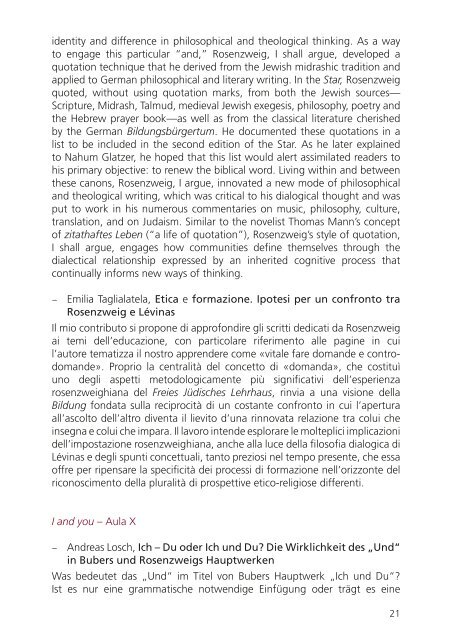Franz Rosenzweig
VZ2hG1
VZ2hG1
You also want an ePaper? Increase the reach of your titles
YUMPU automatically turns print PDFs into web optimized ePapers that Google loves.
identity and difference in philosophical and theological thinking. As a way<br />
to engage this particular “and,” <strong>Rosenzweig</strong>, I shall argue, developed a<br />
quotation technique that he derived from the Jewish midrashic tradition and<br />
applied to German philosophical and literary writing. In the Star, <strong>Rosenzweig</strong><br />
quoted, without using quotation marks, from both the Jewish sources—<br />
Scripture, Midrash, Talmud, medieval Jewish exegesis, philosophy, poetry and<br />
the Hebrew prayer book—as well as from the classical literature cherished<br />
by the German Bildungsbürgertum. He documented these quotations in a<br />
list to be included in the second edition of the Star. As he later explained<br />
to Nahum Glatzer, he hoped that this list would alert assimilated readers to<br />
his primary objective: to renew the biblical word. Living within and between<br />
these canons, <strong>Rosenzweig</strong>, I argue, innovated a new mode of philosophical<br />
and theological writing, which was critical to his dialogical thought and was<br />
put to work in his numerous commentaries on music, philosophy, culture,<br />
translation, and on Judaism. Similar to the novelist Thomas Mann’s concept<br />
of zitathaftes Leben (“a life of quotation”), <strong>Rosenzweig</strong>’s style of quotation,<br />
I shall argue, engages how communities define themselves through the<br />
dialectical relationship expressed by an inherited cognitive process that<br />
continually informs new ways of thinking.<br />
– Emilia Taglialatela, Etica e formazione. Ipotesi per un confronto tra<br />
<strong>Rosenzweig</strong> e Lévinas<br />
Il mio contributo si propone di approfondire gli scritti dedicati da <strong>Rosenzweig</strong><br />
ai temi dell’educazione, con particolare riferimento alle pagine in cui<br />
l’autore tematizza il nostro apprendere come «vitale fare domande e controdomande».<br />
Proprio la centralità del concetto di «domanda», che costituì<br />
uno degli aspetti metodologicamente più significativi dell’esperienza<br />
rosenzweighiana del Freies Jüdisches Lehrhaus, rinvia a una visione della<br />
Bildung fondata sulla reciprocità di un costante confronto in cui l’apertura<br />
all’ascolto dell’altro diventa il lievito d’una rinnovata relazione tra colui che<br />
insegna e colui che impara. Il lavoro intende esplorare le molteplici implicazioni<br />
dell’impostazione rosenzweighiana, anche alla luce della filosofia dialogica di<br />
Lévinas e degli spunti concettuali, tanto preziosi nel tempo presente, che essa<br />
offre per ripensare la specificità dei processi di formazione nell’orizzonte del<br />
riconoscimento della pluralità di prospettive etico-religiose differenti.<br />
I and you – Aula X<br />
– Andreas Losch, Ich – Du oder Ich und Du? Die Wirklichkeit des „Und“<br />
in Bubers und <strong>Rosenzweig</strong>s Hauptwerken<br />
Was bedeutet das „Und“ im Titel von Bubers Hauptwerk „Ich und Du“?<br />
Ist es nur eine grammatische notwendige Einfügung oder trägt es eine<br />
21


